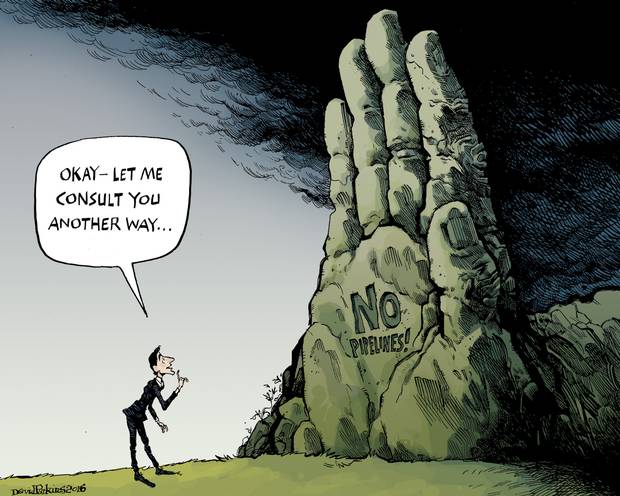

The empty NEB hearing room was a stark contrast to the public protesting outside. Photos by Eugene Kung.
January was a busy start to the new year on the Kinder Morgan file. Here’s a snapshot:
BC’s opposed
On January 11, 2016 the Province of BC came out against the project, because of oil spill risk and inadequate spill response.
BC can do its own assessment
Later that week, the BC Supreme Court released its decision in Coastal First Nations v British Columbia, a court case concerning the obligation of the Province to consult with First Nations in relation to the Enbridge Pipelines and Tankers Project, which has major implications for the Kinder Morgan Pipeline and Tankers expansion project as well. The case concerns the BC-Canada Equivalency Agreement – an agreement between the BC Environmental Assessment Office and the National Energy Board signed in 2010 that allows for the National Energy Board (NEB) process to substitute for a BC Environmental Assessment process. The BC Supreme Court decision confirmed that the Province must consult First Nations on whether to withdraw from the Equivalency Agreement to conduct its own assessment of the Enbridge project, and also confirms that the Province must consult with First Nations about whether to issue a certificate at all – two conclusions that apply equally to the Kinder Morgan project. Read our environmental law alert about the decision here.
NEB ‘public’ hearings
From January 19-29, 2016 the NEB held its ‘public’ hearings in Burnaby for Kinder Morgan’s pipeline expansion proposal, amidst daily protests outside, and – due to the NEB’s decision to close the hearings to the public – the eerie sadness of a poorly attended wake inside. You can find video archives of the oral summary arguments on the NEB website.
What happened while the NEB was at work
In the meantime, while the NEB was hearing arguments in Burnaby, Tsleil-Waututh Nation’s appeal of the NEB’s hearing order that started its Kinder Morgan review was argued before the Federal Court of Appeal on January 22, 2016. The Attorney General of Canada requested an adjournment, which was partially granted to enable Canada to consider whether its inherited legal position on consultation and marine shipping would change. Canada is to advise the court of its change by April 22, 2016.
On January 26th, also during the NEB hearings in Burnaby, the Commissioner of the Environment and Sustainable Development, a branch of the Office of the Auditor General, tabled a report in the House of Commons indicating the NEB “is failing to follow through and adequately track the compliance of pipeline companies with the conditions set for their projects”.
“Transition”
The very next day, on January 27th, the Federal Government revealed a little more about its much anticipated transition plan for Kinder Morgan and Energy East, when Ministers McKenna and Carr unveiled five principles that proposed pipelines will be measured against for the “transition phase.” Unfortunately, the NEB’s Kinder Morgan and Energy East review processes were not halted, despite calls from First Nations, Municipal Governments, and ENGOs including West Coast. This means that (for the moment) the NEB remains on schedule to issue its recommendation regarding Kinder Morgan on May 20, 2016.
In the meantime, Kinder Morgan and Energy East will be subject to an assessment of upstream Greenhouse Gas (GHG) emissions (those associated with the recovery, extraction, dilution, transportation and upgrading of bitumen) and direct GHG emissions (those associated with the pipeline itself), incorporate science and Indigenous knowledge, seek and consider public views, and meaningfully consult and accommodate Indigenous peoples. The transition phase will not consider “downstream” GHG emissions – meaning those that result when the bitumen, transported through the pipeline, is refined and burnt.
The Federal Cabinet also extended its timeframe to make a decision on Kinder Morgan by 4 months, delaying their final decision and timeline to complete the transition phase until December 2016.
Can the government “restore trust in environmental assessment”?
The stated goal of the Federal Government’s transition plan is to “restore trust in environmental assessment.” So far in this process, the NEB had to stretch its 15 month time limit to 25 months, while still being criticized for not adequately considering and testing evidence, not to mention monitoring or enforcing its conditions. So, it will be no small feat to restore that confidence within the next 10 months when the Federal Cabinet is set to make its decision. The announcement that the federal government will conduct its own consultations and review of greenhouse gas emissions may not cut it.
If the next ten months are all like the last month, I’m going to need much more coffee.
by Eugene Kung, Staff Counsel
http://www.theglobeandmail.com/incoming/article28478142.ece/BINARY/w620/NEWWEB-monedcar01col1.jpg
(David Parkins/The Globe and Mail)